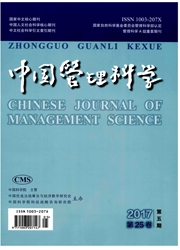

 中文摘要:
中文摘要:
投资者是否理性在金融理论中至关重要。本文利用日度交易价格数据,对中国股票市场在极端风险下的反应特征进行了统计实证研究。基于2002—2013年的数据发现,中国股票市场在极端风险下会表现出一些有趣且显著的反应特征。具体表现为:1.在股市出现极端下跌情形下,市场会由于过度反应而在接下来的一个交易日内表现出显著的反转特征;而在股市出现极端上涨情形下,市场在接下来的交易日内并没有明显的反应模式;2.与熊市相比,在出现极端下跌风险下,市场在牛市中更容易出现过度反应而表现出反转特征。实证研究结果还发现,基于极端风险构建的投资交易策略要显著的优于有效市场假说的买入并持有策略。本文的实证研究结果不仅表明投资者的非理性特征。而且还表明这种非理性特征已经影响到资产的定价。
 英文摘要:
英文摘要:
The question whether or not investors in financial markets are rational is of great importance in finance.The rationality of Chinese stock market under extreme risk is investiated in this paper.Defining extreme risk as returns above(below) a specified threshold,a statistical indicator is proposed to investigate the market response to extreme risk.Based on daily prices of Chinese stock market index over January1,2002-October 28,2013,our results demonstrate some interesting characteristics of Chinese stock market under the extreme risk:1.stock index is found to rebound in case of sharp fall in stock index;no such evidence is found in case of sharp rise in stock index;2.compared to bear market,stock index in bull market tends to rebound in case of extreme downside risk.Trading strategy based on extreme risk outperforms the simple buy-and-hold strategy,indicating the irrationality of Chinese stock market in case of extreme risk.The empirical findings demonstrate that investors in Chinese stock market is irrational and that extreme risk is an important factor in asset pricing.
 同期刊论文项目
同期刊论文项目
 同项目期刊论文
同项目期刊论文
 期刊信息
期刊信息
